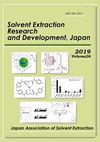Masking Effects for Mo, Re, Pd and Ru by S and N-Donor Reagents through MIDOA and Ntaamide Extraction
IF 0.4
4区 工程技术
Q4 CHEMISTRY, MULTIDISCIPLINARY
引用次数: 11
Abstract
In this study, we examined the masking effects of 16 water-miscible reagents, on the extraction of Mo, Re, Ru, and Pd. These reagents included soft Nand/or Sdonor atoms in their structures and they function as multidentate ligands. The extractants, methylimino-N,N-dioctylacetamide (MIDOA) and N,N,N’,N’,N’’,N’’-hexaoctyl-nitrilotriacetamide (NTAamide(C8)), show significantly high distribution ratios for these metals(D(M)), were employed in this study. Masking effects were observed as a decrease in D(M) with an increase of masking agent concentration in these extraction systems. The results showed that D(Pd) can be considerably decreased by the addition of thiourea, cysteine, cysteamine, trisaminoethylamine, and diethylenetriamine, and D(Ru) is decreased by the addition of thiourea, trisaminoethylamine, and diethylenetriamine. Pd and Ru can be masked by similar reagents including Nor Sdonor atoms, which suppressed the extraction into the organic phase. In contrast, D(Mo) was only slightly masked by the above-mentioned reagents. The masking of Mo was achieved using methylimino-N,N’-diethylacetamide, hexaethyl-nitrilotriacetamide, iminodiacetic acid, and iminodimethylphosphonic acid, which have a central N(CH2C(P)=O)2 framework that is important for this purpose. A masking agent for Re was not found in this study.S和n供体试剂通过MIDOA和酰胺萃取对Mo、Re、Pd和Ru的掩蔽作用
在这项研究中,我们检测了16种水混溶试剂对Mo, Re, Ru和Pd萃取的掩蔽效应。这些试剂在其结构中含有软的Nand/或s给体原子,它们作为多齿配体起作用。本研究采用的萃取剂为甲基氨基-N,N-二辛基乙酰胺(MIDOA)和N,N,N ',N ',N ',N ',N ',N ',N ' -六辛基-硝基三乙酰胺(NTAamide(C8)),它们对这些金属(D(M))的分布比显著较高。在这些萃取体系中,随着掩蔽剂浓度的增加,可以观察到掩蔽效应,即D(M)降低。结果表明,添加硫脲、半胱氨酸、半胱胺、三胺乙胺和二乙基三胺可显著降低D(Pd),添加硫脲、三胺乙胺和二乙基三胺可降低D(Ru)。钯和钌可以被类似的试剂掩盖,包括Nor供体原子,这抑制了萃取到有机相。相比之下,D(Mo)仅被上述试剂轻微掩盖。Mo的掩蔽是用甲基氨基-N、N ' -二乙基乙酰胺、六乙基-硝基三乙酰胺、亚氨基二乙酸和亚氨基二甲基膦酸来实现的,它们的中心N(CH2C(P)=O)2框架对这一目的很重要。本研究未发现Re的掩蔽剂。
本文章由计算机程序翻译,如有差异,请以英文原文为准。
求助全文
约1分钟内获得全文
求助全文
来源期刊
CiteScore
1.30
自引率
14.30%
发文量
10
审稿时长
1 months
期刊介绍:
Solvent Extraction Research and Development, Japan (Solvent Extr. Res. Dev., Jpn.) is a periodical issued from Japan Association of Solvent Extraction (JASE) containing papers dealing with all aspects of solvent extraction and their related methods, underlying principles, and materials. Original articles, notes, technical reports, and critical reviews will be considered for publication. Original articles must be of reasonably broad scope and significance to the solvent extraction. Notes will originally describe novel work of a limited nature or especially significant work in progress. Authors can contribute some information of novel techniques, equipment or apparatus, reagents and diluents for solvent extraction as technical reports. Critical reviews will be received from the authors to whom the editorial committee asked to contribute.

 求助内容:
求助内容: 应助结果提醒方式:
应助结果提醒方式:


